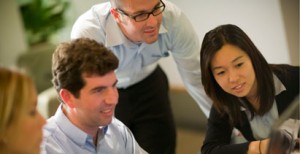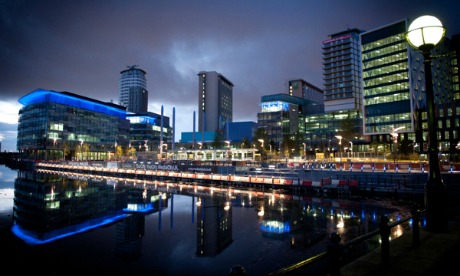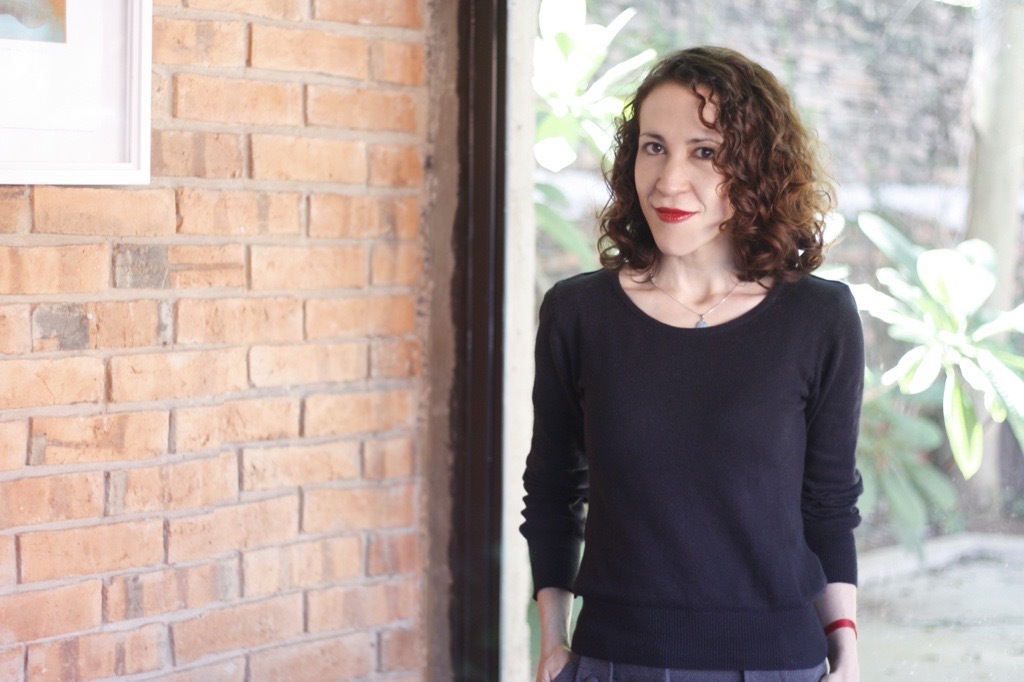Trans-disciplinary learning at the new University of Salford MediaCityUK campus
In October 2012, the University of Salford opened its new MediaCityUK campus to 1 500 students across the broad area of ‘media and digital technologies’. Alongside the new home of 5 departments of the BBC and the largest HD studio block in Europe, with ITV moving in soon, the University has taken over 4 floors to deliver leading edge teaching, research and enterprise with bleeding edge technology. Cutting beneath this statement of the University’s presence at the heart of the UK’s major media hub outside London, the first 12 months have seen a successful shift to new ways of working across the silos that can be found in any university. The emphasis is firmly upon trans-disciplinary learning and innovation.
The design of the new building is the most significant feature for its vital contribution to collaborative and transparent ways of working.
The studio facilities and digital display areas are impressive, but the design of the new building is the most significant feature for its vital contribution to collaborative and transparent ways of working. The main stairway was the architect’s favourite feature for its impressive linkage of all floors (not many of us take the lifts), but it is also an explicit demonstration of the emphasis upon connectivity throughout the building. This extends to all staff, occupying an open plan office, with a mix of allocated spaces and hot desks for those who occasionally work there. In this we emulate the easy and highly productive coming together of students from over 40 programmes of study and research areas from creative media to creative technology, with Business, Health, Social Sciences and Humanities also making a major contribution to how the University has positioned itself as a major driver of the MediaCityUK innovation eco-culture.

‘live briefs’ – projects designed in collaboration with industry that challenge students to deliver solutions to ‘real world’ problems
In practice, the extent and advantage of trans-disciplinary learning (in intellectual and economic terms) draws heavily upon key aspects of the academic ethos that are becoming second nature to staff and students after 12 months. Principal amongst these is the emphasis upon ‘live briefs’ – projects designed in collaboration with industry that challenge students to deliver solutions to ‘real world’ problems. This is facilitated by bringing students together from different disciplines and different levels of study for delivery of tangible outputs. This is not just a theoretical whim. It is based upon considerable experience of live briefs across many of these disciplines before transition to MediaCityUK. The concept was extensively tested with students and industry partners. Those working in the ever-increasing number of businesses that are dependent upon digital technologies, have been forthcoming in their support and recognise the significance of bringing students together who have different but complementary spheres of expertise. The rich mix of disciplines also accommodates exploration of new digital applications, along with analysis of new business models emanating from embedded digital workflow.
Students are actively encouraged to develop their professional reputation through display of outputs, networking with industry partners who visit the new campus, and extensive use of social media to bring their skills and abilities to a global marketplace.
Other core features of our work at MediaCityUK include development of deploying advanced screen technologies and sophisticated systems integration to exhibit the talent of our students and staff. The white water of talent drives the innovation eco-culture. It is not perceived to be a placid talent pool, from which industry and business can simply scoop up what is required, leaving the rest to go stagnant. Rather, we see it as a dynamic, occasionally turbulent, maelstrom of talent that can power new ways of working and of thinking. As such, students are actively encouraged to develop their professional reputation through display of outputs, networking with industry partners who visit the new campus, and extensive use of social media to bring their skills and abilities to a global marketplace.
Educational partnerships are crucial to how we exploit the professional and collaborative environment we have created at MediaCityUK.
Educational partnerships are crucial to how we exploit the professional and collaborative environment we have created at MediaCityUK. Most visitors from industry and business feel at home in a building designed to promote the same kind of open and transparent ways of working that you will find in the neighbouring BBC departments. Indeed, we share our space with a post-production company through an educational partnership that includes students having access to that professional environment. By blurring the boundaries between learning and work, we are able to offer students distinctive opportunities not only to acquire expertise through access to colour grading technology that is rarely seen outside Soho, but also to develop important skills of business and client management. This is also prominent in a range of educational partnerships established with Adobe, BT, Avid, the BBC, ITV, HP, Mediasmiths and others. Through these collaborations we have been able first to establish our credentials as key providers of education in media and digital technology, and then to enhance our position as the home of next generation of talent leading innovation.
By re-orientating expertise in creative digital production, digital technology, digital entrepreneurship and digital application – frequently subsuming University structures such as Colleges and Schools in order to carve out the sweet spot of collaboration – we are able to work with our partners on bringing innovation to the marketplace. International collaborations enhance the global dimensions of those partnerships and promote the University of Salford and MediaCityUK as major innovators in
media and digital technologies within the UK and across the world. Our students are not just the drivers of that – they are also, individually and collectively, the beneficiaries. As with some of our existing alumni, now returning to us to engage with the MediaCityUK campus, the next generation of graduates will also drive value back into the trans-disciplinary learning environment we have designed.





